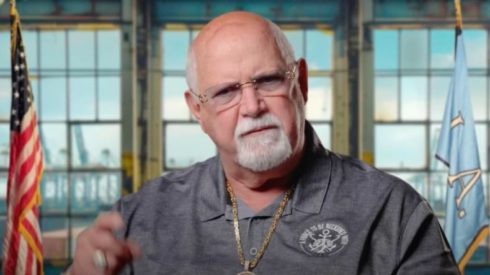Harold Daggett, the head of the International Longshoremen’s Association (ILA), has made it clear that the ongoing strike at some of the largest US ports will continue indefinitely until the union’s demands for better pay are met. Speaking on the picket lines in New Jersey, Daggett was resolute in his stance, warning that ports would remain shut unless meaningful progress is made in negotiations.
“We’re going to fight for it and we’re going to win, or this port will never open up again,” Daggett declared. The strike has brought container traffic across 14 major U.S ports to a standstill, significantly impacting businesses and consumers, and raising concerns about the future of U.S trade and the economy. The strike, which marks the first walkout for the ILA since 1977, involves tens of thousands of dockworkers on both the East and Gulf Coasts, all demanding a better labor deal after months of stalled negotiations.
Economic Impact of the Strike and Government Responses
The port shutdowns have sparked widespread concern about the broader economic impact. U.S. businesses are bracing for significant disruptions in supply chains, with delays on goods deliveries already affecting some sectors. Experts estimate that more than a third of U.S imports and exports pass through the affected ports, including those in New York, Georgia, and Texas. The prolonged closure of these key ports could lead to higher prices, shortages, and economic strain, both domestically and globally.
President Joe Biden, while acknowledging the dockworkers’ contributions during the pandemic, has so far resisted calls from major business groups to invoke federal powers to temporarily reopen the ports. “Now is not the time for ocean carriers to refuse to negotiate a fair wage for these essential workers while raking in record profits,” Biden said, showing support for the workers’ demands but signaling caution in using executive powers to intervene directly.
Negotiations Stalled, Disruptions Expected to Worsen
Talks between the union and the United States Maritime Alliance (U.SMX) have been stalled for months, with no major breakthroughs reported. The union is demanding significant increases in pay and protections against automation. Daggett has made clear that nothing short of a $5 per year hourly pay raise for the contract’s duration will suffice. The USMX, representing shipping companies and port associations, has offered a nearly 50% wage increase and other benefits, but the union is holding firm on its demands.
In the meantime, cargo ships are backing up outside ports, with an estimated 100,000 containers waiting to be unloaded in the New York area alone. Hamid Moghadam, CEO of Prologis, warned of the long-term effects, stating, “It’s going to interfere with the proper functioning of the flow of goods.” The disruption could be particularly damaging as the holiday season approaches, with many businesses relying on timely deliveries to meet consumer demand.
U.S; Business Community Urges Swift Resolution
The business community is growing increasingly anxious as the strike drags on. For small business owners like Danny Reynolds, who runs a clothing store in Indiana, the impact is already being felt. “About 25% of my inventory hasn’t arrived yet, and I’m worried about special-order bridal gowns,” Reynolds said, echoing the concerns of many retailers dependent on East Coast ports for their merchandise.
Reynolds also joined the chorus of voices urging the Biden administration to step in, saying, “I think it’s beyond time for the Biden administration to sit down at the table with them and see what can’t be done to open this thing back up.” As delays mount, both businesses and consumers face increasing uncertainty about when the strike might end and how long they can hold out without a resolution.
Political Support and Calls for Resolution
Political figures from both major parties have weighed in on the strike, with Republican presidential candidate Donald Trump voicing his support for the dockworkers. “American workers should be able to negotiate for better wages, especially since the shipping companies are mostly foreign flag vessels,” Trump said in a statement, positioning himself as an ally of labor in the battle against multinational corporations.
Despite the growing urgency, negotiations between the ILA and the United States Maritime Alliance (USMX), which represents shipping companies and port associations, remain stalled. The USMX has offered substantial concessions, including a nearly 50% wage increase, enhanced retirement benefits, and improved healthcare. However, the union has rejected these proposals, with Daggett calling for a $5 per hour raise annually and protections against automation.
The ongoing stalemate has prompted businesses like Stephenson’s, a 93-year-old clothing store in Indiana, to express concerns over delays in shipments. Owner Danny Reynolds stated that while his business could endure through the end of the year, he feared the broader economic consequences of a prolonged strike. He urged the Biden administration to intervene, suggesting that a federal cooling-off period could be necessary to reopen the ports and ease the supply chain crisis.














